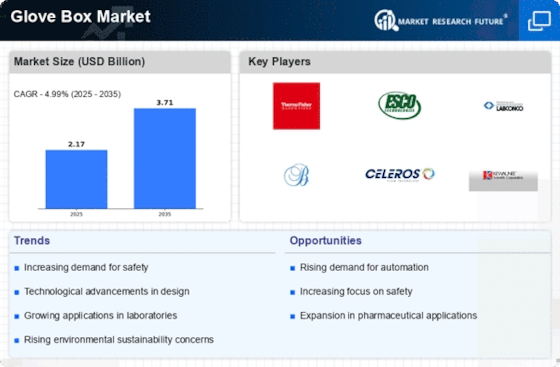Top Industry Leaders in the Glove Box Market

*Disclaimer: List of key companies in no particular order
Top listed global companies in the industry are:
- Coy Laboratory Products Inc. (US)
- Cole-Parmer Instrument Company LLC (US)
- Glove Box Technology Limited (UK)
- Vacuum Atmospheres Company (US)
- MBRAUN (Germany)
- Inert Corporation (US)
- LC TECHNOLOGY SOLUTIONS INC (US)
- Banthrax Corporation (US)
- Germfree Laboratories Inc. (US)
- Jacomex (France)
- GS GLOVEBOX Systemtechnik GmbH (Germany)
- Marine & Industrial Plastics Ltd (UK)
- Miwa Mfg. Co. Ltd (Japan)
- Changsha Deco Equipment Co. Ltd (China)
- Bangalore Vacuum Technology (India), and others.
Navigating the Glove Box Market: Tightly Packed but Full of Potential
The global glove box market presents a compact yet competitive arena where established players and aspiring companies wrestle for dominance. Understanding the strategies powering this competition, the factors determining market share, and emerging trends is crucial for thriving in this space.
Key Players and their Winning Moves:
- Global Giants: Industry titans like Yanfeng Automotive Interiors and Continental AG leverage their extensive design capabilities, global reach, and brand recognition to secure a significant market share. Yanfeng offers diverse glove box solutions across vehicle segments, while Continental excels in advanced features like integrated lighting and temperature control.
- Regional Champions: Companies like Minda Industries and Seoyon E-HW Corp. dominate specific geographies by tailoring solutions to regional preferences and cost competitiveness. Minda caters to India's demand for budget-friendly options, while Seoyon E-HW excels in South Korea's focus on advanced features.
- Agile Innovators: Newcomers like LG Hausys and CIE Automotive are disrupting the market with cutting-edge approaches. LG Hausys focuses on lightweight and eco-friendly materials, while CIE Automotive pushes the boundaries of connected glove boxes with smartphone integration and personalized storage solutions.
Factors Influencing Market Share:
- Product Breadth and Depth: Offering a range of glove boxes for diverse vehicle segments (luxury, budget, electric) and functionalities (locking, cooling, charging) expands market reach and caters to varied customer needs.
- Cost-Effectiveness and Value Proposition: Balancing advanced features with affordability is crucial, especially in budget-conscious segments. Minda's cost-effective glove boxes have secured a strong foothold in emerging markets.
- Integration and Smart Features: Seamless integration with vehicle interiors and features like ambient lighting, USB charging ports, and connected functionality attract tech-savvy customers. Continental's smart glove boxes exemplify this trend.
- Material Innovation and Sustainability: Utilizing lightweight, eco-friendly materials like recycled plastics and bio-composites reduces environmental impact and resonates with sustainability-conscious consumers. LG Hausys' focus on such materials exemplifies this commitment.
Emerging Trends and Innovation:
- Connectivity and Personalization: Integrating glove boxes with infotainment systems, offering personalized storage configurations, and enabling smartphone interaction creates a user-centric experience. CIE Automotive's connected glove boxes exemplify this trend.
- Focus on Autonomous Vehicles: Designing glove boxes with voice-activated controls and seamless integration with self-driving systems caters to the future of mobility. Continental's research in this area exemplifies this foresight.
- Material Advancements: Developing self-cleaning materials, antimicrobial coatings, and odor-resistant surfaces enhances hygiene and user comfort. LG Hausys' research in self-cleaning materials exemplifies this innovation.
- Focus on Safety and Regulations: Designing glove boxes with childproof locks, impact-resistant materials, and compliance with regional safety regulations is paramount. Yanfeng's focus on safety standards exemplifies this commitment.
Overall Competitive Landscape:
The glove box market presents a dynamic arena where established players face challenges from regional champions and innovative startups. Success hinges on offering diverse and cost-effective solutions, embracing technological advancements like connectivity and personalization, catering to the evolving autonomous vehicle landscape, and prioritizing sustainability and safety. Companies demonstrating agility, innovative spirit, and a commitment to user experience hold a strong hand in navigating this tightly packed but promising market.
Latest Company Updates:
August 2023- Qualcomm is best known for the chips and modems inside Android phones. But in recent years, it's also started selling a package of hardware chips, sensors, and software called Snapdragon Digital Chassis to automakers like GM, Hyundai, and Volvo. Now, it's hoping to capitalize on the hype around generative artificial intelligence to convince automakers to buy more of these chips and build new scenarios around them, such as smart assistants that would help drivers navigate around cities, make reservations, and do other daily computing tasks. Automotive revenue is still a small business for Qualcomm. It reported USD1.32 billion in sales in its fiscal 2022, or about 3% of the company's overall sales. However, the company says that it can expect that its chips will be used in forthcoming cars over the next few years and will project more than USD 9 billion in sales in 2031. Qualcomm makes between USD200 and 3,000 per car that uses its chips and software, officials said last fall at an investor event. The company also makes USD5 per car that's connected to 5G through licensing fees. One example of the company's presence in cars: GM's new electric USD130,000 Cadillac Escalade IQ SUV uses Qualcomm chips and software to help power the vehicle's 55-inch dashboard display, as well as lane-keeping and hands-free driving features under GM's "Ultra Cruise" branding. The SUV also notably does not allow users to mirror their phones to the entertainment system, a feature known as Apple CarPlay or Android Auto, meaning drivers will interact with GM's chosen software interface, increasing the importance of the in-car computer experience. Qualcomm faces stiff competition from other chipmakers in the car chip business. Computer-focused chip companies like Intel, through its Mobileye subsidiary, and Nvidia sell automotive products, in addition to traditional auto suppliers such as Continental, NXP Semiconductors, and Bosch, which are all vying to supply parts and chips that power dashboards and driver assistance systems.










